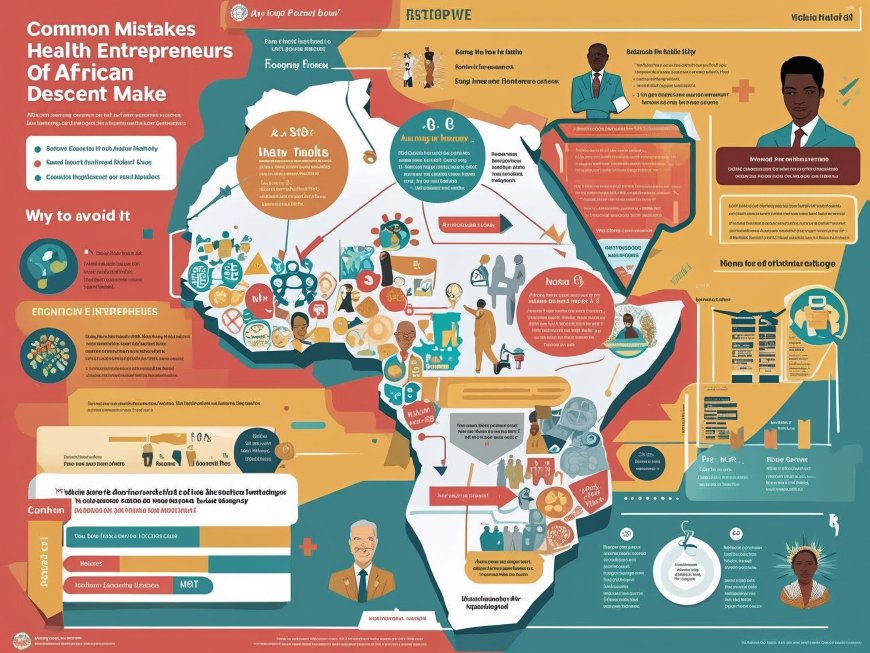7 Common Mistakes Health Entrepreneurs Make — And How to Avoid Them
Learn the 7 most common pitfalls health entrepreneurs face and how to sidestep them. From poor product-market fit to ignoring regulations, we break it down with real African examples, practical advice, and a dose of humor.

“A man who uses his mouth to count his teeth will never know which one aches.” — African Proverb
Let’s face it: building a health startup is tough. You’ve got the dream, the pitch deck, the accelerator invite… but still, many promising health entrepreneurs in Africa crash and burn before they even reach clinical trials—or clients.
So, what gives? Let’s dissect 7 of the most common mistakes health innovators make, and more importantly, how you can avoid becoming the next cautionary tale.
1. 🚑 Solving Problems That Don’t Exist (or Only Exist in PowerPoint)
Too many founders build products based on donor data sheets or assumptions — not what real patients, doctors, or nurses actually need.
🩺 Real-Life Oops:
A Nairobi-based startup launched a telehealth app requiring constant 4G access... in areas where users barely had 2G and zero Wi-Fi.
“We built a Ferrari where people needed a bicycle,” the founder later confessed.
✅ Fix It:
-
Conduct real-world needs assessments. Talk to community health workers, not just hospital CEOs.
-
Use tools like human-centered design and co-creation workshops with rural users.
2. 💸 Burning Through Funding Without Building a Sustainable Model
Getting that grant is great—until you realize you're broke 10 months later and your users won’t pay for your freemium model.
😬 Sound Familiar?
You give away your health app for free, but your server bill makes you weep every month.
✅ Fix It:
-
Explore diverse revenue streams: B2B licensing, SMS-based services, NGO partnerships.
-
Study models like mPharma or Zipline that mix innovation with solid business thinking.
📚 See:
Zipline’s Model - https://flyzipline.com
mPharma - https://mpharma.com/
3. 🧪 Skipping the Clinical or Regulatory Validation Step
Health is not a playground. If your tool diagnoses, prescribes, or treats, it must pass clinical validation and regulatory approval.
🚨 True Story:
A Ugandan team got shut down after their app made incorrect pregnancy risk scores due to a poor algorithm. They hadn’t consulted a single OBGYN.
✅ Fix It:
-
Partner with licensed clinicians from Day 1.
-
Understand your country’s digital health regulations (hint: most countries now have some).
📘 Check: WHO Digital Health Guidelines (2023) – https://www.who.int/publications/i/item/9789240063036
4. 🧑🏾⚕️ Ignoring the Frontline Health Workers
If nurses, midwives, and CHWs hate your platform, it’s doomed. Full stop.
🤦🏽 Quote from a Nurse in Kisii:
“Why should I double enter data—on paper for the ministry and again in your fancy tablet app?”
✅ Fix It:
-
Integrate into existing workflows, don’t disrupt them without offering benefits.
-
Design for interoperability with national HMIS or DHIS2.
5. 📉 Scaling Too Fast, Too Soon
You're in 3 counties. Then you rush into 12. Suddenly you can't support any of them well—and users start dropping like flies.
🪂 Example:
A Nigerian startup overextended into Francophone West Africa without adapting content or hiring French-speaking staff.
✅ Fix It:
-
Nail product-market fit before expanding.
-
Think “pilot → proof → scale,” not “launch → land everywhere.”
6. 📱 Overbuilding Tech, Underbuilding Trust
You’ve got an app with AI, chatbots, ML, and blockchain. But no one trusts it because they’ve never heard of you and your brand feels cold and foreign.
🙅🏽♀️ Anecdote:
A midwife in rural Kenya deleted a new app, saying, “I don’t trust apps that don’t say who they are.”
✅ Fix It:
-
Build a trustworthy brand: show faces, credentials, local stories.
-
Use testimonials, WhatsApp communities, and peer referrals to grow.
7. 📊 Ignoring Data Privacy & Ethical Considerations
Health data is sacred. Yet some startups store patient records in Google Sheets and wonder why no one uses their service.
😱 Example:
A Tanzanian startup was caught sharing user data with advertisers. It’s now extinct.
✅ Fix It:
-
Prioritize data protection from the start (think GDPR, POPIA, or Kenya’s Data Protection Act).
-
Encrypt, anonymize, and get informed consent.
📌 Resource: Kenya’s Data Protection Act – https://www.odpc.go.ke/data-protection-act/
😂 Bonus Mistake: “My Uncle Is a Doctor, So I Know Healthcare”
Health is complex. Don’t assume because you’ve been to a hospital or have a medical cousin, you know how systems work.
“Even a lizard in the sun believes it’s doing yoga.”
Stick to what you know, and collaborate for what you don’t.
📢 Final Word: Learn From Others — Don’t Be a Case Study
Health entrepreneurship in Africa is a noble mission. But noble intentions don’t protect you from naive execution. Avoid these mistakes and you’ll stand a much better chance at building something that lasts, scales, and saves lives.
Let’s build better. Smarter. With more humility and a bit more humor.
🧠 Resources to Keep You Smarter:
-
WHO Digital Health Atlas: https://digitalhealthatlas.org
-
VillageReach Innovation Hub: https://www.villagereach.org
-
PATH Digital Square Toolkit: https://digitalsquare.org/
-
“Why Startups Fail” by Tom Eisenmann (Harvard Business Review, 2021) – https://hbr.org/2021/05/why-startups-fail
Got your own war story or lesson to share? We want to hear it! Email us at editor@doctorsexplain.net or tag us on social media with #HealthStartupFailsAfrica
What's Your Reaction?
 Like
0
Like
0
 Dislike
0
Dislike
0
 Love
0
Love
0
 Funny
0
Funny
0
 Angry
0
Angry
0
 Sad
0
Sad
0
 Wow
0
Wow
0

















































































